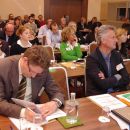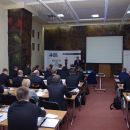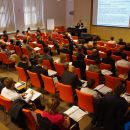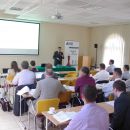| Article Index |
|---|
| Start |
| Previous editions |
| Agenda |
| Speakers |
| Location |
| Registration |

Dear sirs,
According to European Commission requirements, member countries of the EU will introduce a system in which electrical energy from renewable sources will be verified in the ‘Guarantees’ system. In order to introduce the new scheme, Polish legislation ratified new legal regulations citing the source of electrical energy - Guarantees of Origin (GoO). As with any new law, there are many questions about this new structure.
According to European Commission requirements, member countries of the EU will introduce a system in which electrical energy from renewable sources will be verified in the ‘Guarantees’ system. In order to introduce the new scheme, Polish legislation ratified new legal regulations citing the source of electrical energy - Guarantees of Origin (GoO). As with any new law, there are many questions about this new structure.
According to the definition (2009/28/EC Art. 15.6), GoO is an electronic document specifying at least:
- the energy source where the energy was created and the beginning and end dates of production;
- type of energy (e.g., electrical, heating, or cooling);
- location and capacity of the energy block where the energy unit was produced;
- whether, and to what extent, the block was supported by external investment;
- whether, and to what extent, the energy unit used any other system of support;
- the day when the installation commenced;
- the issuing date, country, and identification number.
Each Guarantee has a unique identification number and is filed in a special registry, which in Poland will be coordinated by the Energy Regulatory Office (ERO). It works similarly to e-banking; tracking the transfer of Guarantees (starting from producer through trader, supplier, all the way to consumer) to ensure no chance of mismatch between energy units and the number of Guarantees.
Contrary to previous systems that were limited to the countries where they operated, properly acquired Guarantees can be traded between all EU countries. Currently, the European Energy Certificate System (EECS) functions in countries such as: Norway, Sweden, Finland, Denmark, Germany, Holland, the UK, Ireland, Belgium, Luxemburg, France, Spain, Switzerland, Austria, Italy, Portugal, and Slovenia. As a result, the above-mentioned countries, together with Poland, will be able to trade the GoO-certified energy among each other. The growing interest in GoO is exemplified by the ever-increasing number of countries who have introduced the GoO scheme already, as well as the fact that by the end of December 2012 the European Energy Exchange (EEX) started trading those same instruments.
Why Acquire GoO?
- GoO has an implicit monetary value;
- GoO can be traded internationally, as opposed to Certificates of Origin;
- Guarantees can extend the portfolio of products and services;
- GoO can be used in reports to document a firm’s environmental policies and sustainability;
- GoO can be used in contract-signing to showcase new business opportunities.
Guarantee implementation brings with it a number of challenges and opportunities to both the Polish and European energy sectors; therefore, we present you with the "New system of Guarantees of Origin (GoO). Procedures, market and trade aspect", second-edition seminar. This event will take place on 17 December 2013 in Warsaw, Poland. The seminar will focus on the roles of the producer and distributor: the responsibilities of the two in their relationship. For example, in Poland, GoO is issued by ERO based on an application completed by the producer of the renewable energy, and forwarded to the distributor where the GoO unit will be transferred. The seminar will also demonstrate the benefits and opportunities for trading the Guarantees.
- European and Polish regulations of renewable energy
- Distribution and categories of GoO
- Acquisition process
- Rules of issuing, registering and trading
- Functioning and organization of the GoO registry
- The energy source, type of fuel, location, power, dates and deadlines
- GoO’s "life cycle" - issuing, transfering, expiring
- Relations between producers and distributors
- Distributor’s responsibilities
- Development of the GoO-branded product
- Data verification in the GoO application
- PURE application deadlines
- The authentication of amount of energy produced in the renewable energy producing installation
- Distributors
- Companies producing and selling electrical energy and heat
- Commercial consumers of energy
- Energy and certification brokers and traders
- Energy auditors and controllers
- Legal firms, consultant firms, and engineers interested in new market and RSE















